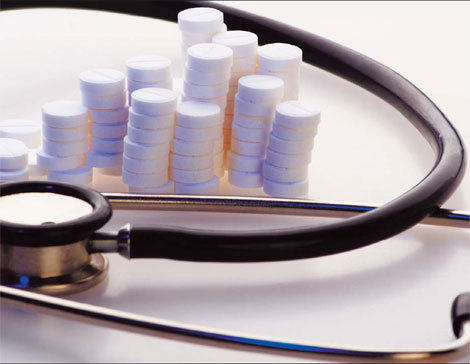
Although aspirin may guard against cancer, experts warn that people who want to take aspirin on a regular basis should talk to their doctors first. [Photo/China Daily
A new report from British scientists suggests that long-term, low-dose aspirin use may modestly reduce the risk of dying of certain cancers, though experts warn the study isn't strong enough to recommend healthy people start taking a pill that can cause bleeding and other problems. In a new observational analysis published online in the medical journal Lancet, Peter Rothwell of the University of Oxford and colleagues looked at eight studies that included more than 25,000 patients and cut the risk of death from certain cancers by 20 percent.
While some experts say the analysis adds to evidence of aspirin's potential to cut cancer risk, others say it falls short of changing advice to healthy people, and it fails to show the benefits apply equally to women.
The trials mostly compared men who took a daily dose of at least 75 mg of aspirin for heart problems to people who took a placebo or another drug. On average, the studies lasted at least four years.
Researchers used national cancer registries to get information on participants after the studies ended, though they weren't sure how many aspirin takers continued using it or how many people in the comparison groups might have started.
The researchers said that the projected risk after two decades of dying from cancers like lung and prostate would be 20 percent lower in groups who had taken aspirin and 35 percent lower for gastrointestinal cancers like colon cancer. These odds are figured from smaller numbers - there were 326 lung cancer deaths in all, for example.
Only one-third of people in the analysis were women - not enough to calculate any estimates for breast cancer. There appeared to be no benefit to taking more than 75 mg daily - roughly the amount in a European dose of baby aspirin and a bit less than the baby aspirin dose in the United States.
The analysis left out a high-quality experiment that tested aspirin every other day in nearly 40,000 US women. No reduction in cancer risk was seen except for lung cancer deaths in that trial.
No funding was provided for the new Lancet analysis but several of the authors have been paid for work for companies that make aspirin and similar drugs.
Scientists say it would take some time to digest the study results and figure out which people should take aspirin.
Eric Jacobs, an American Cancer Society epidemiologist, calls it a "major contribution" and says the study results, in addition to previous research, suggested aspirin's effects on the risk of dying from several cancers "appear likely".
Others say the study wasn't strong enough for doctors to start recommending aspirin.
"I definitely think we wouldn't want to make any treatment decisions based on this study," says Dr Raymond DuBois, a cancer prevention specialist who is provost of the University of Texas M.D. Anderson Cancer Center.
One concern is that the studies were designed to look at cardiovascular risks, so the groups of people being compared may differ on things that affect cancer risk, such as family history of the disease. DuBois also questions drawing conclusions about people's cancer risk beyond the several years they were tracked.
Aspirin has long been recommended for some people with heart problems. But it can have serious side effects, like bleeding in the stomach and intestines, and poses risks in groups like the elderly who are prone to falls.
"Balancing the risks and benefits of aspirin is really important and probably something that needs to be done on an individual basis," says Ed Yong, Cancer Research UK's head of health evidence and information. He was not linked to the study.
"If anyone is considering aspirin on a regular basis, they should talk to their doctor first," Yong says. He warns people should not think of aspirin as a guarantee against cancer and other prevention strategies like not smoking and keeping a healthy body weight were essential.
taken from : China Daily



No comments:
Post a Comment